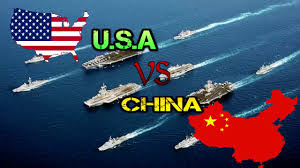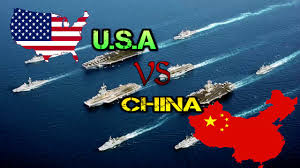
Key American exports to China including soybeans, planes, cars, beef and chemicals were the target of planned Chinese tariffs as the second largest economy of the world quickly hit back at the U.S. plans of targeting Chines imports to the country worth $50 billion.
The news sent the global markets in to a tail spin.
In less than 11 hours since the U.S. President Donald Trump’s administration targeted about 1,300 Chinese industrial technology, transport and medical products imported into the U.S. with 25 per cent tariffs, the Chinese government retaliated with the latest plans of tariffs on U.S. products.
This move ahs further escalated the ongoing trade tensions between the two largest economies of the world.
The notion that the tit-for-tat moves by both the countries can be called a trade war was dismissed by Trump who has earlier blamed the former administrations of serving the United States badly in matters of trade relations.
“We are not in a trade war with China, that war was lost many years ago by the foolish, or incompetent, people who represented the U.S.,” he wrote on Twitter early on Wednesday.
However, there can be some room for negotiations because the tariffs would not be implemented on an immediate basis. It will be at least two months that the U.S government would seek public opinion on the trade tariffs following the publication of Washington’s list. The date of the implementation of the tariffs by the U.S. will decide the effective date of China’s moves on its proposed tariffs.
Possibility of resolution of the tensions through talks were expressed by U.S. Commerce Secretary Wilbur Ross and Trump’s economic adviser, Larry Kudlow. Kudlow said, “No. I don’t see it that way. This is a negotiation, using all the tools” when asked about whether the trade war could be lost by the U.S.
The global stock markets and commodities market went into turmoil after the latest news on the trade war came out.
Beijing’s list of U.S. export items that are to be tariffed sent more or less all export-based company stocks in the U.S. down.
There was a 2.7 per cent drop in the shares of aerospace giant Boeing Co which constitutes the single largest exporter to China at midday in New York. There was a slip of 4.4 per cent in the shares of Deere & Co – the maker of agricultural machinery while Caterpillar stocks slipped by 1.8 percent.
The drop in the stock price of big U.S. manufacturers and chipmakers dragged down the Dow Jones Industrial Average by 0.56 percent. The S&P 500 slipped 0.29 percent. While oil dropped to a two-week low, there was fall in the U.S. dollar.
(Source:www.reuters.com)
The news sent the global markets in to a tail spin.
In less than 11 hours since the U.S. President Donald Trump’s administration targeted about 1,300 Chinese industrial technology, transport and medical products imported into the U.S. with 25 per cent tariffs, the Chinese government retaliated with the latest plans of tariffs on U.S. products.
This move ahs further escalated the ongoing trade tensions between the two largest economies of the world.
The notion that the tit-for-tat moves by both the countries can be called a trade war was dismissed by Trump who has earlier blamed the former administrations of serving the United States badly in matters of trade relations.
“We are not in a trade war with China, that war was lost many years ago by the foolish, or incompetent, people who represented the U.S.,” he wrote on Twitter early on Wednesday.
However, there can be some room for negotiations because the tariffs would not be implemented on an immediate basis. It will be at least two months that the U.S government would seek public opinion on the trade tariffs following the publication of Washington’s list. The date of the implementation of the tariffs by the U.S. will decide the effective date of China’s moves on its proposed tariffs.
Possibility of resolution of the tensions through talks were expressed by U.S. Commerce Secretary Wilbur Ross and Trump’s economic adviser, Larry Kudlow. Kudlow said, “No. I don’t see it that way. This is a negotiation, using all the tools” when asked about whether the trade war could be lost by the U.S.
The global stock markets and commodities market went into turmoil after the latest news on the trade war came out.
Beijing’s list of U.S. export items that are to be tariffed sent more or less all export-based company stocks in the U.S. down.
There was a 2.7 per cent drop in the shares of aerospace giant Boeing Co which constitutes the single largest exporter to China at midday in New York. There was a slip of 4.4 per cent in the shares of Deere & Co – the maker of agricultural machinery while Caterpillar stocks slipped by 1.8 percent.
The drop in the stock price of big U.S. manufacturers and chipmakers dragged down the Dow Jones Industrial Average by 0.56 percent. The S&P 500 slipped 0.29 percent. While oil dropped to a two-week low, there was fall in the U.S. dollar.
(Source:www.reuters.com)





